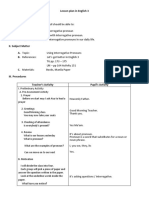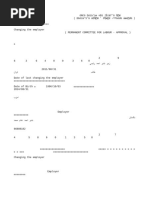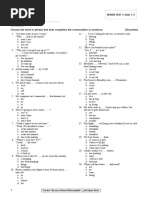Les Mis
Les Mis
Uploaded by
Dani EsterhuysenCopyright:
Available Formats
Les Mis
Les Mis
Uploaded by
Dani EsterhuysenCopyright
Available Formats
Share this document
Did you find this document useful?
Is this content inappropriate?
Copyright:
Available Formats
Les Mis
Les Mis
Uploaded by
Dani EsterhuysenCopyright:
Available Formats
QUESTION WORDS
THEORY
Task 1: Study the table below shows when to use different question words.
Question words
Who Where
Use "who" to identify a person or Use "where" for information about the
group of people. location of something or someone.
Examples: Examples:
● Who is your best friend? ● Where is the nearest park?
● Who is inside the house? ● Where do you live?
When What
Use "when" for information about the time or Use "what" for information about a thing
date of an event or action. or an action.
Examples: Examples:
● When is your birthday? ● What is your favourite food?
● When does the movie start? ● What are you doing?
How Why
Use "how" for information about the way Use "why" to ask for a reason or
or manner to do something. explanation. something.
Examples: Examples:
● How do you cook pasta? ● Why are you late?
● How did you solve the problem? ● Why is the door open?
ESL Pals 1 Grammar Worksheet
Task 2: Study the guide on how to form questions with each word.
Structure
1. Start with the question word.
Begin your question with one of the words: what, where, when, why, who, or how.
2. Follow with the verb.
Add a verb (action word) that relates to what you're asking about.
3. Add additional words.
Depending on the question, you may need to add more words like nouns, adjectives,
or adverbs to complete the question.
Who Where
Who + verb + subject Where + verb + noun/location
Example: Example:
● Who is your best friend? ● Where do you live?
When What
When + verb + time/event What + verb + noun/adjective
Example: Example:
● When is your birthday? ● What is your name?
How Why
How + verb + manner/adjective Why + verb + action/reason
Example: Example:
● How can I learn to code? ● Why are you sad?
Please note
You can adapt these structures to create a wide range of questions in English.
ESL Pals 2 Grammar Worksheet
MULTIPLE CHOICE QUESTIONS
Task: Create questions by choosing the correct word.
1. __________ do you like to go on vacation?
a. Who
b. Where
2. _________ is your favourite book?
a. Why
b. What
3. _________ is your favourite actor?
a. What
b. Who
4. _________ is the capital of France?
a. Who
b. What
5. _________ is your wedding anniversary?
a. Why
b. When
6. _________ does this machine work?
a. How
b. What
7. _________ is it important to recycle?
a. Why
b. How
8. _________ is your birthday?
a. Why
b. When
9. _________ does the bus arrive at the station?
a. When
b. What
10. _________ do you stay organised?
a. What
b. How
ESL Pals 3 Grammar Worksheet
WORD ORDER
Task: Put the words in the correct order to create grammatically correct questions.
1. President / United / the / of / States / is / Who / the
2. are / of / regular / What / exercise / benefits / the
3. good / find / a / Where / restaurant / can / sushi / I
4. is / Who / best / your / friend
5. War / When / World / end / II / did
6. skills / improve / my / time / can / management / How / I
7. When / first / the / computer / was / invented
8. your / When / appointment / dentist / is
9. What / are / your / career / aspirations
10. of / the / CEO / is / Apple / Who
11. Why / love / travel / you / do / to
12. to / Where / your / is / favourite / place / relax
13. need / to / sleep / Why / do / people
14. cookie / perfect / How / chocolate / you / a / bake / chip / do
15. wake / you / up / typically / When / the / in / do / morning
ESL Pals 4 Grammar Worksheet
CREATE QUESTIONS
Task: Study each answer (1-12), then create questions based on the statement.
The first one has been done for you, use this as a guide.
1. The capital of France is Paris.
Question: What is the capital of France?
2. My favourite author is J.K. Rowling.
Question: _________________________________________________________________.
3. In my free time, I like to read books.
Question: _________________________________________________________________.
4. The nearest post office is located on Main Street.
Question: _________________________________________________________________.
5. My anniversary is on October 14th.
Question: _________________________________________________________________.
6. I love to travel because it allows me to explore new cultures.
Question: _________________________________________________________________.
7. The main ingredients in chocolate are cocoa and sugar.
Question: _________________________________________________________________.
8. Recycling is important for the environment because it helps reduce waste.
Question: _________________________________________________________________.
9. You can improve your time management skills by creating a daily schedule.
Question: _________________________________________________________________.
10. The school year starts in September.
Question: _________________________________________________________________.
11. I live in Manchester, England.
Question: _________________________________________________________________.
12. The capital of Japan is Tokyo.
Question: _________________________________________________________________.
ESL Pals 5 Grammar Worksheet
DIALOGUE PRACTICE
Task 1: Complete the dialogue below with the correct question word.
Nathan: Hey Hannah! ____________ are you going on vacation?
Hannah: I’m going to Florida.
Nathan: That sounds great! ____________ are you going?
Hannah: I’m going on December 14th, so in two weeks.
Nathan: ____________ did you decide to go to Florida?
Hannah: I decided to go to Florida because it’s sunny and I love the beaches.
Nathan: ____________ is going with you?
Hannah: I’m going with my two friends and my brother.
Nathan: Great! ____________ are you getting there?
Hannah: We're going to drive there. It's a road trip!
Nathan: Sounds fun! Enjoy your holiday, Hannah!
Task 2: Answer the following comprehension questions based on the dialogue.
1. Who is talking in the dialogue?
2. Who is going on holiday?
3. Where are they going?
4. When are they going?
5. Why did they choose the destination?
6. How are they getting to the destination?
Task 3:
● Can you identify the different tenses used in the text?
ESL Pals 6 Grammar Worksheet
Les Misérables
Mention that it is one of the longest-running musicals in the world.
Musical (뮤지컬) Example: "I'm going to watch a musical at the theater this weekend."
Revolution (혁명) Example: "The French Revolution was a significant event in history."
Justice (정의) Example: "Justice must be served to ensure a fair society."
Redemption (구원) Example: "The character's journey toward redemption is a central theme in the story."
Protagonist (주인공) Example: "Jean Valjean is the protagonist of 'Les Misérables.'"
Barricade (바리케이드) Example: "During the revolution, they built a barricade in the streets."
Injustice (불의) Example: "Fighting against injustice is a noble cause."
Character (캐릭터) Example: "Marius is a complex character in the musical."
Adaptation (적응) Example: "The movie adaptation of the book was well-received by audiences."
Victor Hugo (빅토르 위고) Example: "Victor Hugo is a renowned French author known for his novels."
Useful Expressions (5 expressions):
"I'm a big fan of..."
"I really enjoy..."
"In my opinion..."
"What do you think about...?"
"I can't stand..."
• "What is the main message or lesson you think 'Les Misérables' teaches?"
• "Do you think the characters in 'Les Misérables' are relatable?"
• "Have you ever experienced a situation where you felt the need for justice?"
• "What other musicals or books do you enjoy, and why?"
"In the musical 'Les Misérables,' my favorite character is __________ because..."
"When I think about justice, I believe that __________."
"Redemption is important because it teaches us __________."
"If I were the protagonist of a story, I would want to be like __________ because..."
"During a revolution, I imagine I would __________ to support the cause."
"One injustice I feel strongly about is __________ because..."
"When it comes to character development in stories, I appreciate it when __________."
"Adapting a book into a movie can be challenging because __________."
"If I had the chance to meet Victor Hugo, I would ask him __________."
"In 'Les Misérables,' the theme of love is evident when __________."
Gap Fill Exercise: Question Words in "Les Misérables"
Instructions: Fill in the blanks with the appropriate question words and verb forms.
___________ is the musical that tells the story of Jean Valjean.
___________ did Victor Hugo write "Les Misérables"?
___________ are the main themes of the story?
___________ is the name of the police inspector who relentlessly pursues Valjean?
___________ does Fantine face such difficult circumstances?
___________ becomes the adoptive father of Cosette?
___________ is the significance of the barricades in the plot?
___________ are some of the challenges the characters encounter during the revolution?
___________ is your favorite song from the musical?
___________ can readers learn from the character of Jean Valjean?
DISCUSSION QUESTIONS
Task 1: Answer the following questions using full sentences.
1. What is your favourite season?
2. Where do you go to school?
3. Why do you go to school?
4. When do you usually do exercise?
5. Who is the best sports person you know?
6. How do you like to spend your weekends?
7. What hobbies do you have?
8. Where is your favourite place to relax?
9. When do you typically wake up in the morning?
10. Why do you like / not like to read books?
11. Who helps you when you need to make an important decision?
12. How often do you go to the supermarket?
13. What do you eat for breakfast?
14. Where do you usually go for lunch?
15. Why do you watch TV in the evenings?
ESL Pals 8 Grammar Worksheet
WORD ORDER Task: Put the words in the correct order to create grammatically correct questions.
1. favourite / What / your / is / colour
2. go / your / last / did / vacation / Where / on / you
3. your / birthday / When / is
4. you / job / current / did / your / Why / choose
5. your / Who / friend / is / best
6. your / How / like / to / you / spend / do / weekends
7. hobbies / your / are / What
8. you / Where / do / live
9. a / bike / When / did / you / to / first / ride / learn
10. do / you / enjoy / reading / Why / books
11. musician / your / Who / is / favourite
12. you / morning / your / How / prepare / do / coffee
13. for / you / did / What / breakfast / have / today
14. Where / planning / are / travel / to / you / next
15. you / Why / English / are / studying
CREATE QUESTIONS
Task: Study each answer (1-12), then create questions based on the statement.
The first one has been done for you, use this as a guide.
1. I work as a teacher.
Question: What do you do for a living?
2. I hang out with friends at the local cafe.
Question: _________________________________________________________________.
3. I prefer working from home for convenience.
Question: _________________________________________________________________.
4. I check my email every hour.
Question: _________________________________________________________________.
5. I listen to pop music.
Question: _________________________________________________________________.
6. I keep my important documents in a locked drawer.
Question: _________________________________________________________________.
7. I commute to work alone.
Question: _________________________________________________________________.
8. I stay in touch with my family through phone calls.
Question: _________________________________________________________________.
9. I am learning the guitar because I want to be a famous rock star.
Question: _________________________________________________________________.
10. I play video games in my free time.
Question: _________________________________________________________________.
11. I buy groceries at the nearby supermarket.
Question: _________________________________________________________________.
12. I take a walk in the park to relax and enjoy nature.
Question: _________________________________________________________________.
ESL Pals 10 Grammar Worksheet
You might also like
- All in All Book 1Document76 pagesAll in All Book 1ALyn Yen100% (4)
- Doc.10047-EN Aviation Security Oversight Manual PDFDocument62 pagesDoc.10047-EN Aviation Security Oversight Manual PDFGodhuli Raman100% (3)
- January 25-26, 2018 - Imperatives and PrepositionsDocument39 pagesJanuary 25-26, 2018 - Imperatives and PrepositionsJessica Manawes Navor100% (2)
- Wh-Words NewDocument5 pagesWh-Words NewMOISES VAZQUEZNo ratings yet
- T10 Class 6 Lesson 2ADocument22 pagesT10 Class 6 Lesson 2Aasly celeste veira lealNo ratings yet
- Basic 4 HandoutDocument36 pagesBasic 4 HandoutACNAMALAS1No ratings yet
- Libro Ingles Nivel 3Document89 pagesLibro Ingles Nivel 3Julian VelascoNo ratings yet
- Inglés n3 UnificadoDocument91 pagesInglés n3 UnificadoJeniffer Stefania Palacios MaciasNo ratings yet
- Asking For and Sharing Personal InfoDocument6 pagesAsking For and Sharing Personal InfoekatchicherinaNo ratings yet
- Group 3 IR Batch 2018 French 15 Summary MidTestDocument11 pagesGroup 3 IR Batch 2018 French 15 Summary MidTestNanda AlyfiaNo ratings yet
- Present SimpleDocument9 pagesPresent SimpleMelvin JesusNo ratings yet
- Summry M1-M4Document42 pagesSummry M1-M4coffee69kNo ratings yet
- Detailed Lesson Plan in English 3Document5 pagesDetailed Lesson Plan in English 3Jonas Pinon100% (5)
- ENGLISH IV Unit 1 Module 5. Reflecting On What I'Ve LearnedDocument34 pagesENGLISH IV Unit 1 Module 5. Reflecting On What I'Ve LearnedJoemar FurigayNo ratings yet
- Lesson PlanDocument6 pagesLesson PlanJohn Rey De AsisNo ratings yet
- Daniels Top 10 Guiding PrinciplesDocument69 pagesDaniels Top 10 Guiding PrinciplesKAREN SALVE MAUTENo ratings yet
- Modul Bahasa Inggris Ilkom 2018Document67 pagesModul Bahasa Inggris Ilkom 2018RATRI CANDRASARI100% (1)
- ENGLISH 9 Q1 Week 1 2Document10 pagesENGLISH 9 Q1 Week 1 2Jhonalene PerezNo ratings yet
- Slides Curso de Inglés Básico A1 Fechas, Horas y Expresiones SimplesDocument95 pagesSlides Curso de Inglés Básico A1 Fechas, Horas y Expresiones SimplesAndres CordobaNo ratings yet
- Guia de Aprendizaje Ingles Grado 10º A B C.Document8 pagesGuia de Aprendizaje Ingles Grado 10º A B C.Guery Ludh Piñeros GutierrezNo ratings yet
- Inglês A0 Semana 6Document29 pagesInglês A0 Semana 6Eduardo OliveiraNo ratings yet
- Slides Curso de Ingles Basico A1 Fechas Horas y Expresiones Simples PPTXDocument95 pagesSlides Curso de Ingles Basico A1 Fechas Horas y Expresiones Simples PPTXaxel75129752No ratings yet
- Quarter 3-Module 4 - English 6Document14 pagesQuarter 3-Module 4 - English 6Grace Angelie Dale Manulat100% (1)
- Activity 4 - Deductive TeachingDocument9 pagesActivity 4 - Deductive TeachingRauleneNo ratings yet
- U3 Free TimeDocument50 pagesU3 Free TimeRicardo VelasquezNo ratings yet
- ExpressionDocument15 pagesExpressionhenjiegawiranNo ratings yet
- American Empower B1+grammar Unit 3Document155 pagesAmerican Empower B1+grammar Unit 3Dennis EmilioNo ratings yet
- A Detailed Lesson Plan in English 9 DemoDocument6 pagesA Detailed Lesson Plan in English 9 DemoJude Tan100% (2)
- Antolog A CompletaDocument62 pagesAntolog A CompletaSaúl CortésNo ratings yet
- (1.0) Ielts IntermediateDocument204 pages(1.0) Ielts Intermediatechaulylvt100% (1)
- MonologuesDocument5 pagesMonologueslorne InglisNo ratings yet
- University of The Philippines College Entrance Tests Review 2019Document72 pagesUniversity of The Philippines College Entrance Tests Review 2019Zakira MandaueNo ratings yet
- Lesson Plan in English 3Document6 pagesLesson Plan in English 3Ann CelineNo ratings yet
- Types Communicative StrategyDocument17 pagesTypes Communicative Strategyw6yhmvppmcNo ratings yet
- Lesson Plan PerseveranceDocument6 pagesLesson Plan PerseveranceShim CharenNo ratings yet
- Bài Giảng Môn Tiếng Anh 1 - 2009Document278 pagesBài Giảng Môn Tiếng Anh 1 - 2009How Sun100% (1)
- Sample PPT Slides 2 - DetaroDocument38 pagesSample PPT Slides 2 - DetaroNikkie Detaro100% (1)
- Language Pokrmn LedsonDocument84 pagesLanguage Pokrmn LedsondumbphrogssNo ratings yet
- Kinds of SentencesDocument9 pagesKinds of SentencesebuhayanNo ratings yet
- Curso de Ingles Intermedio b1 Expresiones de Tiempo y CantidadDocument247 pagesCurso de Ingles Intermedio b1 Expresiones de Tiempo y CantidadeoliNo ratings yet
- Basic Question FormationDocument8 pagesBasic Question FormationsolekeNo ratings yet
- Lesson Plan-OkDocument8 pagesLesson Plan-OkFerdinand M. AbainzaNo ratings yet
- English Note 4-g-11-2017Document43 pagesEnglish Note 4-g-11-2017jallmero87No ratings yet
- RecoveredDocument27 pagesRecoveredJoel MangallayNo ratings yet
- Blended Question ConversationsDocument16 pagesBlended Question Conversationskashishgg1993No ratings yet
- B1.+ - Unit 1 - GRAMMARDocument21 pagesB1.+ - Unit 1 - GRAMMARVivi Carrión VivancoNo ratings yet
- English I - Writing ProjectDocument11 pagesEnglish I - Writing Projectvictor.alvarez2000No ratings yet
- Doel.Document3 pagesDoel.IsabelNo ratings yet
- LT Assignment - Jasmine Febriana Anisa - 201912500772 - R7GDocument5 pagesLT Assignment - Jasmine Febriana Anisa - 201912500772 - R7GjasmineNo ratings yet
- Honey Lesson PlanDocument10 pagesHoney Lesson PlanShenilyn Francisco AbaldonadoNo ratings yet
- WORKSHEETn3OMAR ROMERODocument9 pagesWORKSHEETn3OMAR ROMEROOmar OspinaNo ratings yet
- Detailed Lesson Plan in Grade IV (English) I. ObjectivesDocument5 pagesDetailed Lesson Plan in Grade IV (English) I. ObjectivesFrancisco Dacuya AlajasNo ratings yet
- Actividad 1-SEMANA1-Grado8Document6 pagesActividad 1-SEMANA1-Grado8lunasofilamejorooNo ratings yet
- WH QuestionsDocument5 pagesWH QuestionsKETY MENDOZANo ratings yet
- Anglais l1 DroitDocument36 pagesAnglais l1 DroitJoseph NseleNo ratings yet
- Kyiv Noivember 2024 SaturdayDocument57 pagesKyiv Noivember 2024 SaturdayNastia OrlovaNo ratings yet
- ENGLISH 9: Anglo-American and Philippine Literature: Quarter 1 Learner's MaterialDocument9 pagesENGLISH 9: Anglo-American and Philippine Literature: Quarter 1 Learner's MaterialAndrhey BagonbonNo ratings yet
- Quarter Two: I, As A Learner Week 6 Becoming A Resourceful LearnerDocument27 pagesQuarter Two: I, As A Learner Week 6 Becoming A Resourceful LearnerRoldan S Gup-ayNo ratings yet
- Coursebook Unit-15Document5 pagesCoursebook Unit-15Đỗ Thảo LinhNo ratings yet
- English7 Q2-W1Document14 pagesEnglish7 Q2-W1Laika Hiromi FukaboriNo ratings yet
- Your Electronic Ticket ReceiptDocument2 pagesYour Electronic Ticket Receiptmichellevinces2810No ratings yet
- Portafolio 1Document3 pagesPortafolio 1ayalegalgroupNo ratings yet
- Plane TicketDocument2 pagesPlane TicketSourajit SanyalNo ratings yet
- भारतीय इतिहासDocument60 pagesभारतीय इतिहासAkash NagarNo ratings yet
- Case 24: Temco: Capital Budgeting: Multiple Projects With Unequal LivesDocument2 pagesCase 24: Temco: Capital Budgeting: Multiple Projects With Unequal LivesKazi HasanNo ratings yet
- Chapter IVDocument45 pagesChapter IVluisacarpio636No ratings yet
- Withdrawal of A Visa Application: Home Page General Enquiry LineDocument6 pagesWithdrawal of A Visa Application: Home Page General Enquiry LineGabriel LadinoNo ratings yet
- Consular Electronic Application Center - Print ApplicationDocument4 pagesConsular Electronic Application Center - Print Application'Celymar Castillo100% (1)
- 12723/telangana Exp Sleeper Class (SL) : Bhopal JN (BPL) Start Date 11-Nov-2023 Ballabgarh (BVH) Arrival N.ADocument2 pages12723/telangana Exp Sleeper Class (SL) : Bhopal JN (BPL) Start Date 11-Nov-2023 Ballabgarh (BVH) Arrival N.Apawan kumarNo ratings yet
- Tourism 2Document2 pagesTourism 2Silke HerbertNo ratings yet
- Assessment of TourismDocument23 pagesAssessment of TourismShannon Jones100% (1)
- Checklist For Polish National Visa - OthersDocument2 pagesChecklist For Polish National Visa - OthersAlamNo ratings yet
- نموذج اعارة معتمد من الكفيلDocument4 pagesنموذج اعارة معتمد من الكفيلOmer Ali ArbagiNo ratings yet
- Quotation For Langkawi Trip For 30 PaxDocument2 pagesQuotation For Langkawi Trip For 30 PaxSorupanathan SadayanNo ratings yet
- Visa Application Health Campus2022Document30 pagesVisa Application Health Campus2022RohailNo ratings yet
- Hotel: Reservations Dialogue (B1) : Did You Understand The Text?Document1 pageHotel: Reservations Dialogue (B1) : Did You Understand The Text?santiago sanchez100% (1)
- Big Oak Hiking Trails: Fairfax State Recreation AreaDocument2 pagesBig Oak Hiking Trails: Fairfax State Recreation AreaChip DouglasNo ratings yet
- Anatomy of The ShipDocument2 pagesAnatomy of The ShipJules UrciaNo ratings yet
- Jamalpur To Dhaka Train Schedule With Ticket PriceDocument2 pagesJamalpur To Dhaka Train Schedule With Ticket PriceRubel RanaNo ratings yet
- Topic 12 Tourism and ResourcesDocument18 pagesTopic 12 Tourism and ResourcesCollins JimNo ratings yet
- Badrinath PackageDocument6 pagesBadrinath Packagecomingcaaditya2023No ratings yet
- Written Essay Ensayo 2 InglesDocument3 pagesWritten Essay Ensayo 2 InglesracheldNo ratings yet
- Travel + Leisure India, Aug 2023Document124 pagesTravel + Leisure India, Aug 2023James ClarkNo ratings yet
- Aadhaar List of Documents EnglishDocument1 pageAadhaar List of Documents Englishprakashdan20No ratings yet
- RevChoicesECCE TRM ReviewTest1 12104Document4 pagesRevChoicesECCE TRM ReviewTest1 12104manosNo ratings yet
- Bus TicketDocument1 pageBus TicketSuman Babu KNo ratings yet
- Guia 2022 ENG WebDocument124 pagesGuia 2022 ENG WebLourdes OO100% (1)
- Stargate Atlantis Season 02 Episode 12 - EpiphanyDocument55 pagesStargate Atlantis Season 02 Episode 12 - EpiphanyvinblanNo ratings yet
- MPTH Finals NotesDocument10 pagesMPTH Finals Notesmanueljc.pupNo ratings yet

























































































